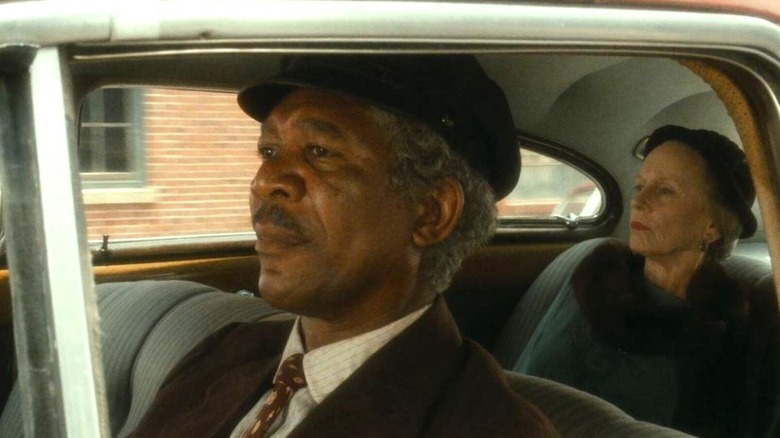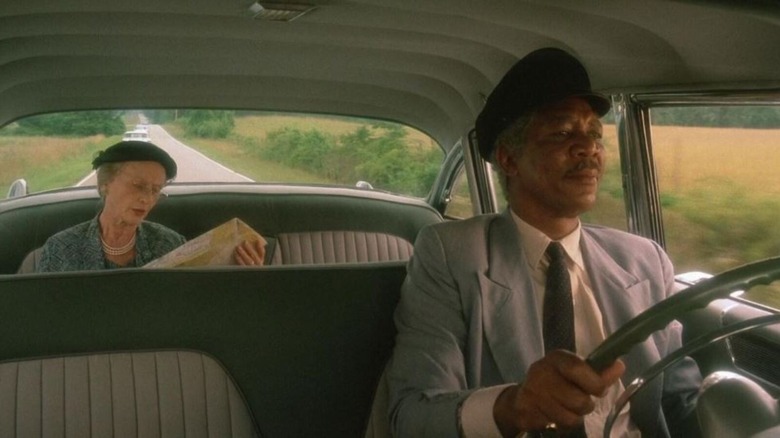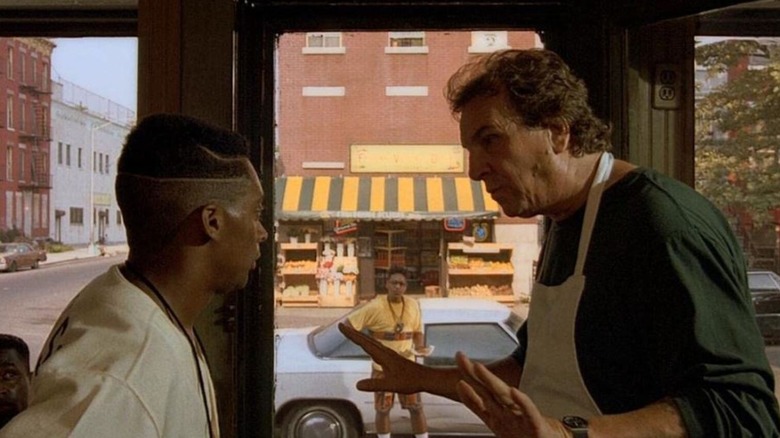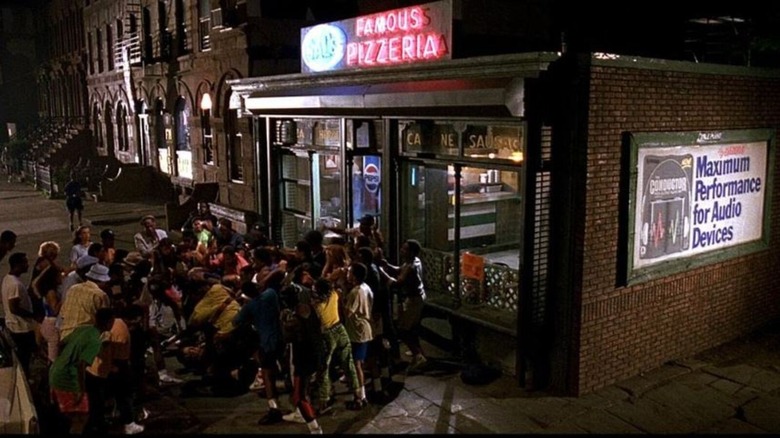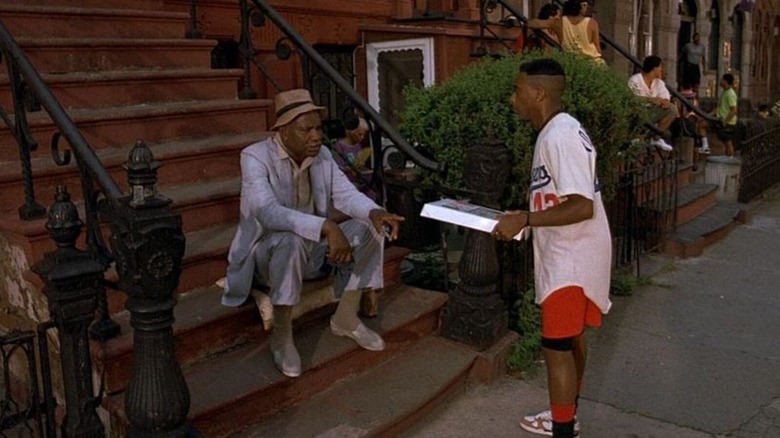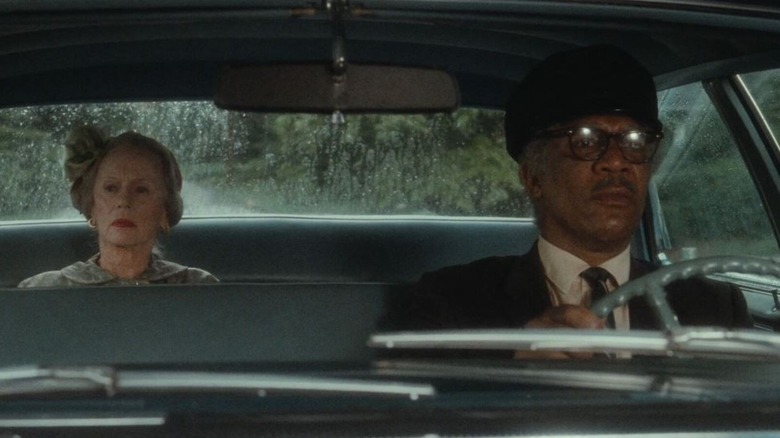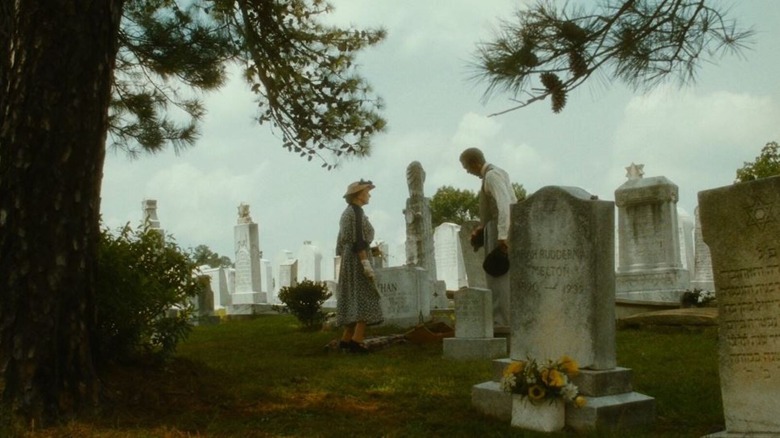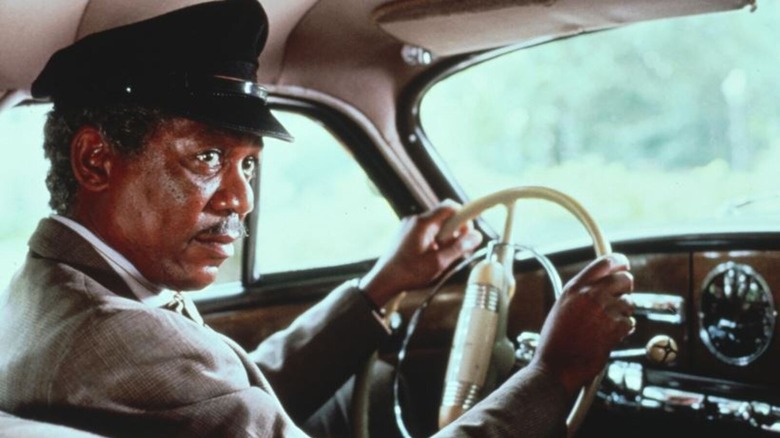The Controversy That Clouded Driving Miss Daisy's Commercial Success
We may receive a commission on purchases made from links.
I loved "Driving Miss Daisy" before I even saw the movie, actually. I remember running around as a kid teasing slow drivers — and slow-moving people in general for that matter — by calling them Driving Miss Daisy because I thought the movie was about an old lady who drove slowly and held up traffic. When I finally watched the 1989 comedy-drama, it only reinforced my adoration. Jessica Tandy shined in her role as Daisy Werthan, an elderly but prideful white Jewish widow who, from the late 1940s and into the early '70s, develops a bond with her kindly Black chauffeur, Hoke Colburn (Morgan Freeman) in Georgia. In my eyes, "Lean on Me," "The Shawshank Redemption," and "Driving Miss Daisy" are Freeman's best movie roles.
Miss Daisy and Hoke's relationship helped shape my knowledge of race relations during the civil rights era beyond the documentaries I watched in school. For example, in one documentary about the Montgomery bus boycott, I learned many African Americans, especially women, caught the bus out to the suburbs to work in the homes of wealthy white families, but "Driving Miss Daisy” gave me an inside peek of their experiences inside those homes. Furthermore, the movie, along with the book "The Diary of Anne Frank," helped inform my earliest understandings of the Jewish community; the scenes in which a cop makes a racist comment about Miss Daisy and Hoke and later when Miss Daisy learns her temple was bombed stuck with me.
Directed by Australian filmmaker Bruce Beresford and written by Alfred Uhry, adapted from his Pulitzer Prize-winning play of the same name, the movie was a blockbuster generally well received by critics. But I learned of a controversy that clouded the film's success and made me second-guess my appreciation for the movie.
Driving Miss Daisy was controversial from the beginning
After "Driving Miss Daisy" hit theaters in December 1989, South Florida Sun Sentinel film critic Candice Russell described the movie as a "mostly one-note film" and Hoke's "toadying manner" in front of the Werthans as "painful to watch." She concluded: "It's one scene after another of a pompous old lady issuing orders and a servant trying to comply by saying 'yassum.”
Russell's criticism aligned with those of the detractors who saw the film as a half-step attempt at tackling race relations. Some called it patronizing; others said the movie romanticized the pre-civil rights movement South. Morgan Freeman, who originally played Hoke in the 1987 Off-Broadway play, recalled to the New York Times in '89 that he had similar worries after white audiences "flocked backstage" in tears and shared how much the play reminded them of their families. He said:
”After a while you start thinking, 'Am I evoking nostalgia?' You know? Because this does evoke a time when everybody was sure who they were and what their place was in life. And now things are a little more complicated."
Freeman consulted his Black friends; they reassured him his character and his relationship with Miss Daisy were great, so he dropped his concerns. But the controversy surrounding the film adaptation reached a pivotal point at the 1990 Academy Awards, where the 80-year-old Jessica Tandy won the Oscar for Best Actress in a Leading Role, becoming the oldest person to ever win an Academy Award at the time. In addition to taking home awards for Best Makeup, and Writing (Adapted Screenplay), "Driving Miss Daisy" won the highly coveted Oscar for Best Picture. But critics said the accolade should have gone to another film that better tackled race relations in America.
The nominee that wasn't on the ballot
The summer before "Driving Miss Daisy" hit theaters, Spike Lee sent a message to America with his controversial comedy-drama, "Do the Right Thing." The film follows pizzeria delivery guy Mookie (Lee), who gets caught in the middle of rising tensions between his Italian American employer, Sal (Danny Aiello), and his Black neighbors on the hottest day of the summer. As a kid, I liked the movie because its Bed-Stuy, Brooklyn environment felt very much like home. The scene where a teenager uses a wrench to turn on the fire hydrant followed by the kids who come splashing in the water especially rings true to my childhood in Detroit. As an adult who's experienced a little bit of life, I now cherish the film for its raw exploration of racial issues in modern day America. Whereas "Driving Miss Daisy" is a subtle movie, "Do the Right Thing" is a smash-mouth, in-your-face flick that is as relevant today as it was in '89. The themes Lee explored, such as boycotts, protests, uprisings, and police brutality have already dominated national headlines in the first years of 2020s. The death of the character Radio Raheem (Bill Nunn), for example, is eerily similar to the real-life police-involved murder of George Floyd.
While not quite the blockbuster that "Driving Miss Daisy" became, "Do the Right Thing" performed well at the box office and won Best Picture at the 1989 Los Angeles Film Critics Association Awards. Many critics and fans alike predicted the same outcome at the Oscars but were stunned when the Academy announced the official nominees for Best Picture and "Do the Right Thing" wasn't on the list.
Did the Oscars do the right thing with Driving Miss Daisy?
The official nominees that competed with "Driving Miss Daisy" for Best Picture at the 1990 Oscars were the biographical and anti-war drama "Born on the Fourth of July," starring Tom Cruise, the Robin Williams-led "Dead Poets Society," the sports fantasy "Field of Dreams," and "My Left Foot," an extraordinary biopic on the life of Irish writer and painter Christy Brown, who had cerebral palsy and learned to paint with his toes. But the absence of "Do the Right Thing" clouded the ceremony. At one point, Kim Basinger took the podium for a presentation, and she called out the Academy. She said:
"We've got five great films here, and they're great for one reason: because they tell the truth. But there is one film missing from this list that deserves to be on it, because ironically, it might tell the biggest truth of all ― and that's 'Do The Right Thing.'"
The Academy did itself and the nominees a disservice. If they had nominated "Do the Right Thing" but awarded Best Picture to say, "My Left Foot," I doubt that year's Academy Awards would have gone down as one of the biggest Oscars snubs in history. Excluding the film from consideration and then awarding the trophy to "Driving Miss Daisy" of all movies only fanned the flames. But just like how the controversy made me question my appreciation for "Driving Miss Daisy," it appeared to have the same effect on the voters. According to a 2015 poll from The Hollywood Reporter, the judges indicated they would award Best Picture to "My Left Foot" if they had a redo ("Do the Right Thing" wasn't included in the poll because it wasn't on the original ballot).
Why was Do the Right Thing snubbed?
The reason why "Do the Right Thing" was snubbed remains an unsolved mystery, but the consensus is that white America, particularly the predominately white, male Academy, wasn't ready for such a film. But like "Driving Miss Daisy," "Do the Right Thing" has its detractors. Before the infamous 1990 Oscars, Orlando Sentinel film critic Jay Boyar called the film the most overrated movie of the year. Others reviewers accused it of having an unclear social message and promoting racial violence. Some even warned the movie would incite Black people to riot, a criticism I personally find ridiculously offensive: Millions of Black people across the nation watch a fictional movie, get angry, and march from the theaters with Tiki torches and burn down the nearest Italian-owned pizzeria. Sure, that makes sense.
The movie's so-called riot scene — Spike Lee prefers the term uprising — happens after a white officer chokes Radio Raheem (Bill Nunn) to death with a baton in front of the Sal's pizzeria. Mookie launches a trash can through the pizzeria's window and all hell breaks loose. I never interpreted this as Lee advocating violence. What I saw was him showing how all humans have a trigger that sends them over the edge, and for many African Americans — people who have been historically traumatized and oppressed — that trigger is experiencing and witnessing racial injustice (in real life, not in a movie theater). Lee explained in his own words in a 2020 interview with Empire. He said:
"If you look historically at the uprising that happened in America, of African Americans, it wasn't like Black folk woke up one morning and said, 'Let's burn it down.' There's a tipping point. The tipping point for Mookie was to see his best friend, Radio Raheem, get choked to death."
The Driving Miss Daisy cloud hangs over Spike Lee
The "Crooklyn" director doesn't mince words when it comes to "Driving Miss Daisy." Twenty-five years after the 1990 Oscars, Spike Lee offered this reflection during an interview with the Daily Beast: "Nobody's talking about motherf******' 'Driving Miss Daisy," he said. "That film is not being taught in film schools all across the world like 'Do the Right Thing' is. Nobody's discussing 'Driving Miss Motherf*****' Daisy.'"
Even though the 1990 Oscars seems to be the one he holds on to the most, it wasn't the last time Lee got snubbed. He directed the 1992 biopic "Malcolm X," another classic film that, along with "Do the Right Thing," was preserved in the U.S. National Film Registry by the Library of Congress as "culturally, historically or aesthetically significant," but it failed to gain a nomination for Best Picture at the Oscars. Then there was 2018's "BlacKkKlansman," based on a memoir about a Black police officer who infiltrated a local Ku Klux Klan chapter in Colorado Springs. Even though the movie won for Best Writing (Adapted Screenplay) and was nominated for Best Picture (a "finally" moment for Lee), it lost to the controversial "Green Book," a biopic about the time Italian American bouncer and later "The Sopranos" actor Frank "Tony Lip" Vallelonga worked as a chauffeur for Black pianist Don Shirley.
"Green Book" was condemned by Shirley's living relatives and received similar criticism to "Driving Miss Daisy." Its selection for Best Picture over "BlacKkKlansman" quickly flashbacked Hollywood to 1990. While Lee was happy to be nominated this time around, he couldn't deny the undeniable. "Every time somebody's driving somebody, I lose," he quipped backstage after the 2019 Academy Awards, according to Deadline. "But they changed the seating arrangement."
The Driving Miss Daisy team responds
The Hollywood Reporter associate editor Trilby Beresford is the daughter of Bruce Beresford, the director of "Driving Miss Daisy." Trilby Beresford explored the controversy surrounding the film in a 2020 piece in which she interviewed key players involved in making the film, including her father, who called the whole thing "sort of absurd." He added: "[The movie] didn't seem to me to be that evil. Hoke had a job. It wasn't as if he was a slave; he could have gone at any time. He was a proud man who was anything but subservient."
When Trilby asked if he believed "Do the Right Thing" should have won the Oscar for Best Picture, Beresford responded: "It was a good film. I liked it," he said. "Should it have? I don't know, perhaps it should have. No matter, I am proud of my film."
Trilby Beresford also interviewed Alfred Uhry, who wrote the play and movie script. He also complimented Spike Lee's film and defended his work. He maintained that "Driving Miss Daisy" accurately reflects the time period it's set in. "You can't write the present into the past," he lamented. Trilby interviewed Morgan Freeman, who appeared to not have any worries since the Off-Broadway encounters he revealed to the New York Times in '89. He told Trilby:
"It was such a different story, such a different approach — it's about a relationship between a man and a woman over a long period of time. It kind of reminds me of these French movies about love. It was literally a love story. I maintain it was one of the best jobs I ever had in the movies. I think [the controversy was] ridiculous."
The verdict on Driving Miss Daisy
I do cringe at Morgan Freeman's performance in "Driving Miss Daisy," but the legendary actor was born in the 1930s and grew up in Mississippi, so he knows a little something about how some Black men may or may not have behaved in front of their white employers in the Jim Crow South. Like Alfred Uhry said, "You can't write the present into the past."
I believe issues regarding Hoke's character stem from how, as Uhry explained to Broadway.com, "Driving Miss Daisy" is based on the writer's childhood memories of his grandmother and her chauffeur, Will Coleman. I'm sure there was way more complexity to Mr. Coleman than what Uhry recalled from his childhood. For example, Beresford said Hoke could've left at any time, but it's not clear why he remains loyal to Miss Daisy. Is it because she teaches him how to read? I hope not because it falls into the "white savior" cliché. Furthermore, we never see Miss Daisy and Hoke develop a relationship that isn't anchored by Hoke's servitude. Even the final scene where Hoke keeps Miss Daisy company in the retirement home ends with him feeding her. Perhaps their relationship would have resonated stronger if Hoke's social standing progressed with the times, but he and Miss Daisy remained friends.
The controversy made me, the judges at the Academy, and Morgan Freeman each question our liking for "Driving Miss Daisy," but like Freeman, I proclaim that I still regard the film as one of my favorite Morgan Freeman movies despite its problems. Also, I refuse to compare it to "Do the Right Thing." They are two different films set in two different time periods that take two unique approaches to express the same universal desire: racial harmony.
